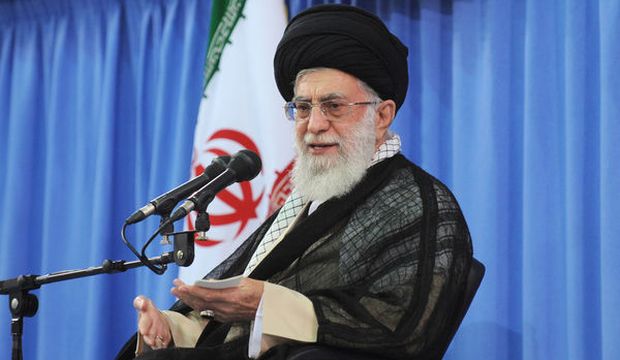
Iran’s Supreme Leader, Ayatollah Ali Khamenei, addresses a meeting of university professors on July 2, 2014. (Leader.ir/HANDOUT)
London, Asharq Al-Awsat—Devoted followers should give up on velayat-e faqih, the cornerstone of Iran’s Islamic political system, if the nuclear talks between Iran and the P5+1 world powers end in a comprehensive agreement, a former IRGC commander said at a conference on July 15.
“If the rumors about Supreme Leader Ali Khamenei being pessimistic about the negotiations prove incorrect [i.e., if negotiations succeed], we should bid farewell to velayat-e faqih,” or rule by a supreme Islamic jurist—the position Khamenei currently holds—Said Qassemi said.
In his remarks, at a conference organized by opponents of President Hassan Rouhani’s reconciliatory foreign policy, Qassemi also criticized Iran’s involvement in the nuclear negotiations, saying: “The Supreme Leader has stressed repeatedly that we should not sit with the Americans at the same negotiating table.”
A video clip of his remarks has been posted online, although the incident has gone unreported in the Iranian media.
Qassemi, a former middle-ranking commander in the influential Iranian Revolutionary Guard Corps, has expressed his pessimism about the talks in the past. A hardliner on Iran’s political scene, his unprecedented comments serve to further underline the discontent among Iranian hardliners with the talks.
The comments in the video clip are one of the rare signs of growing discontent among Iran’s top official aides, and perhaps even suggest that those closest to the Supreme Leader disagree with his decisions on the nuclear file.
Following a number of similar comments recently from senior officials, arguably the most pressing challenge facing the Supreme Leader is quelling disquiet among his own greatest supporters.
Iran’s Supreme Leader has frequently voiced his opposition to talks with the US, although earlier this week he expressed his full support of President Hassan Rouhani’s government and its work to end the nuclear impasse. In the unprecedented remarks, Khamenei said he would do everything in his power to protect his government’s efforts in Vienna.
The negotiations have come under immense pressure as the July 20 deadline to reach a comprehensive deal approaches. Significant gaps remain between the two sides, although it now appears likely the deadline, which is the date the interim deal agreed last November expires, will be extended.
